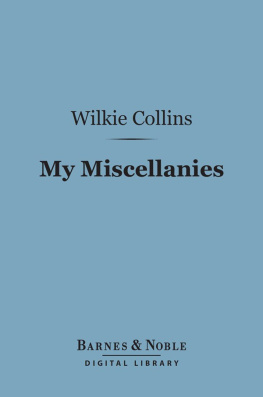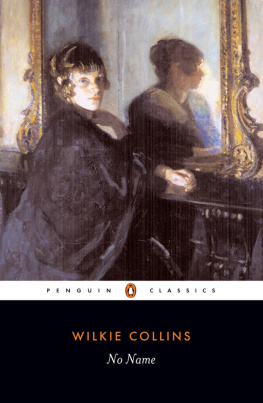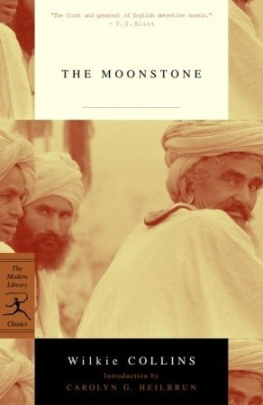Wilkie Collins - My Miscellanies
Here you can read online Wilkie Collins - My Miscellanies full text of the book (entire story) in english for free. Download pdf and epub, get meaning, cover and reviews about this ebook. year: 2022, publisher: BarnesNoble, genre: Humor. Description of the work, (preface) as well as reviews are available. Best literature library LitArk.com created for fans of good reading and offers a wide selection of genres:
Romance novel
Science fiction
Adventure
Detective
Science
History
Home and family
Prose
Art
Politics
Computer
Non-fiction
Religion
Business
Children
Humor
Choose a favorite category and find really read worthwhile books. Enjoy immersion in the world of imagination, feel the emotions of the characters or learn something new for yourself, make an fascinating discovery.
- Book:My Miscellanies
- Author:
- Publisher:BarnesNoble
- Genre:
- Year:2022
- Rating:5 / 5
- Favourites:Add to favourites
- Your mark:
- 100
- 1
- 2
- 3
- 4
- 5
My Miscellanies: summary, description and annotation
We offer to read an annotation, description, summary or preface (depends on what the author of the book "My Miscellanies" wrote himself). If you haven't found the necessary information about the book — write in the comments, we will try to find it.
My Miscellanies — read online for free the complete book (whole text) full work
Below is the text of the book, divided by pages. System saving the place of the last page read, allows you to conveniently read the book "My Miscellanies" online for free, without having to search again every time where you left off. Put a bookmark, and you can go to the page where you finished reading at any time.
Font size:
Interval:
Bookmark:
WILKIE COLLINS

This 2011 edition published by Barnes & Noble, Inc.
All rights reserved. No part of this publication may be reproduced, stored in a retrieval system, or transmitted, in any form or by any means, electronic, mechanical, photocopying, recording, or otherwise, without prior written permission from the publisher.
Barnes & Noble, Inc.
122 Fifth Avenue
New York, NY 10011
ISBN: 978-1-4114-4143-9
PREFACE
T HE various papers of which the following collection is composed were most of them written some years since, and were all originally publishedwith many more, which I have not thought it desirable to reprintin "Household Words," and in the earlier volumes of "All the Year Round." They were fortunate enough to be received with favor by the reader, at the period of their first appearance, and were thought worthy in many instances of being largely quoted from in other journals. After careful selection and revision, they are now collected in book form; having been so arranged, in contrast with each other, as to present specimens of all the shorter compositions which I have contributed in past years to periodical literature.
My object in writing most of these papersespecially those collected under the general heads of "Sketches of Character" and "Social Grievances"was to present what I had observed and what I had thought, in the lightest and the least pretentious form; to address the public (if I could) with something of the ease of letter-writing, and something of the familiarity of friendly talk. The literary Pulpit appeared to me at that timeas it appears to me stillto be rather overcrowded with the Preachers of Lay Sermons. Views of life and society to set us thinking penitently in some cases, or doubting contemptuously in others, were, I thought, quite plentiful enough already. More freshness and novelty of appeal to the much-lectured and much-enduring reader, seemed to lie in views which might put us on easier terms with ourselves and with others; and which might encourage us to laugh good-humoredly over some of the lighter eccentricities of character, and some of the more palpable absurdities of customwithout any unfair perversion of truth, or any needless descent to the lower regions of vulgarity and caricature. With that idea, all the lighter contributions to these Miscellanies were originally written; and with that idea they are now again dismissed from my desk, to win what approval they may from new readers.
HARLEY STREET, LONDON.
SKETCHES OF CHARACTER.I
TALK-STOPPERS
W E hear a great deal of lamentation nowadays, proceeding mostly from elderly people, on the decline of the Art of Conversation among us. Old ladies and gentlemen with vivid recollections of the charms of society fifty years ago, are constantly asking each other why the great talkers of their youthful days have found no successors in this inferior present time. Wherethey inquire mournfullywhere are the illustrious men and women gifted with a capacity for perpetual outpouring from the tongue, who used to keep enraptured audiences deluged in a flow of eloquent monologue for hours together? Where are the solo-talkers, in this degenerate age of nothing but choral conversation?
The solo-talkers have vanished. Nothing but the tradition of them remains, imperfectly preserved in books for the benefit of an ungrateful posterity, which reviles their surviving contemporaries, and would perhaps even have reviled the illustrious creatures themselves as Bores. If they could rise from the dead, and wag their unresting tongues among us now, would they win their reputations anew, just as easily as ever? Would they even get listeners? Would they be actually allowed to talk? I venture to say, decidedly not. They would surely be interrupted and contradicted; they would have their nearest neighbors at the dinner-table talking across them; they would find impatient people opposite, dropping things noisily, and ostentatiously picking them up; they would hear confidential whispering, and perpetual fidgeting in distant corners, before they had got through their first half-dozen of eloquent opening sentences. Nothing appears to me so wonderful as that none of these interruptions (if we are to believe report) should ever have occurred in the good old times of the great talkers. I read long biographies of that large class of illustrious individuals whose fame is confined to the select circle of their own acquaintance, and I find that they were to a man, whatever other differences may have existed between them, all delightful talkers. I am informed that they held forth entrancingly for hours together, at all times and seasons, and that I, the gentle, constant, and patient reader, am one of the most unfortunate and pitiable of human beings in never having enjoyed the luxury of hearing them; but, strangely enough, I am never told whether they were occasionally interrupted or not in the course of their outpourings. I am left to infer that their friends sat under them just as a congregation sits under a pulpit; and I ask myself amazedly (remembering what society is at the present day), whether human nature can have changed altogether since that time. Either the reports in the biographies are one-sided and imperfect, or the race of people whom I frequently meet with nowand whom I venture to call talk-stoppers, because their business in life seems to be the obstructing, confusing, and interrupting of all conversationmust be the peculiar and portentous growth of our own degenerate era.
Perplexed by this dilemma, when I am reading in long biographies about great talkers, I do not find myself lamenting, like my seniors, that they have left no successors in our day, or doubting irreverently, like my juniors, whether the famous performers of conversational solos were really as well worth hearing as eulogistic report would fain have us believe. The one invariable question that I put to myself under these circumstances runs thus: Could the great talkers, if they had lived in my time, have talked at all? And the answer I receive is: In the vast majority of cases, certainly not.
Let me not unnecessarily mention names, but let me ask, for example, if some such famous talker as, saythe Great Glibcould have discoursed uninterruptedly for five minutes together in the presence of my friend Colonel Hopkirk?
The colonel goes a great deal into society; he is the kindest and gentlest of men; but he unconsciously stops, or confuses conversation everywhere, solely in consequence of his own sociable horror of ever differing in opinion with any body. If A should begin by declaring black to be black, Colonel Hopkirk would be sure to agree with him before he had half done. If B followed, and declared black to be white, the colonel would be on his side of the question before he had argued it out; and, if C peaceably endeavored to calm the dispute with a truism, and trusted that every one would at least admit that black and white in combination made gray, my ever-compliant friend would pat him on the shoulder approvingly all the while he was talking; would declare that C's conclusion was, after all, the common sense of the question; and would set A and B furiously disputing which of them he agreed or disagreed with now, and whether on the great Black, White, and Gray question, Colonel Hopkirk could really be said to have any opinion at all.
How could the Great Glib hold forth in the company of such a man as this? Let us suppose that delightful talker, with a few of his admirers (including, of course, the writer of his biography), and Colonel Hopkirk, to be all seated at the same table; and let us say that one of the admirers is anxious to get the mellifluous Glib to discourse on capital punishment for the benefit of the company. The admirer begins, of course, on the approved method of stating the objections to capital punishment, and starts the subject in this manner:
Font size:
Interval:
Bookmark:
Similar books «My Miscellanies»
Look at similar books to My Miscellanies. We have selected literature similar in name and meaning in the hope of providing readers with more options to find new, interesting, not yet read works.
Discussion, reviews of the book My Miscellanies and just readers' own opinions. Leave your comments, write what you think about the work, its meaning or the main characters. Specify what exactly you liked and what you didn't like, and why you think so.







